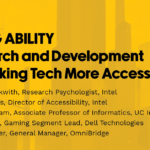
Perspectives
Ethnography, Ethics & Time
Laura Schroeder





An EPIC talk with , DARRYL ADAMS, TIM GRAHAM, STACY BRANHAM, ADAM MUNDER, Computing Accessibility January 26, 3–4:30 pm Pacific time (10–11:30 am AEDT) Free for EPIC Members [s2If current_user_can(access_s2member_level1)] REGISTER [/s2If] [s2If !is_user_logged_in()] TO REGISTER: JOIN EPIC or LOG IN [/s2If] [s2If current_user_is(subscriber)] TO REGISTER: JOIN EPIC [/s2If] Overview One of the biggest challenges…





Friday, April 29, 2016, 5:30–8:30 PM Loop Project Space & Bar, 23 Meyers Place, Melbourne, Australia RSVP Here! We’re excited to partner with Melbourne Professional Design Anthropology to offer a screening and discussion of selected videos from our annual conference—the premier international gathering on ethnography and design in business. Two hours of highlights will include keynote,…





